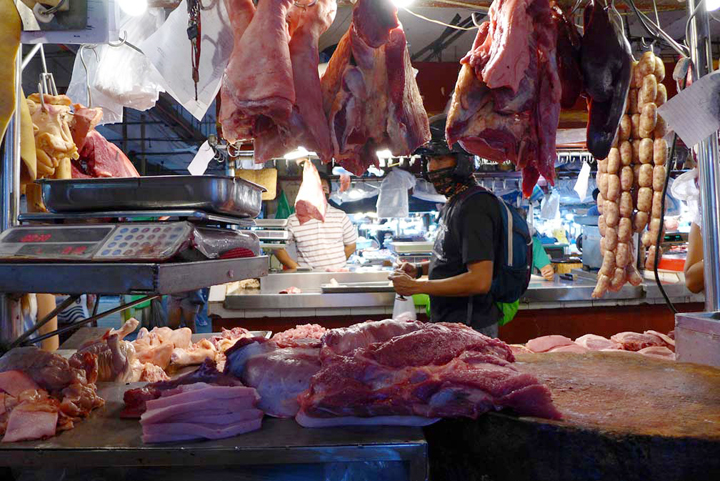
AT least 2.5 million kilograms of imported meat products are currently being held in cold storage facilities pending resolution of the labeling issue, which could further stretch the country’s food supply system, according to industry players.
Meat Importers and Traders Association President Jesus C. Cham said at least 100 containers carrying 2,500 metric tons of various meat products cannot be sold until the labels are rectified.
“And there are more shipments arriving. Importers are now incurring costs because of this. At the same time they cannot easily sell to the market or their clients pending clearance from the authorities,” Cham told the BusinessMirror in a phone interview.
The confiscation of meat shipments started after the National Meat Inspection Service (NMIS) issued a memorandum circular last July 27, which reiterated the strict enforcement of labeling requirements for meat products. (Related story: https://businessmirror.com.ph/2021/08/04/traders-worry-over-label-rules-for-meat-imports/)
The shipments were held in abeyance due to incomplete labels, which did not specify the shelf life or expiration date of the products.
The Bureau of Animal Industry and the NMIS issued a joint memorandum circular (JMC) on meat labeling requirements last August 10 after industry players aired their concerns over the NMIS memorandum circular.
However, the new JMC did not sit well with industry stakeholders. Some of them had pointed out that it contains “legal impediments” and that it had nothing to do with food safety.
The JMC allowed importers to rectify the meat labels of their imports arriving in the country from August 4 to September 30 on the condition that these shipments will be held in abeyance and will only be released upon compliance with the labeling requirements.
The JMC indicated that all meat imports arriving starting October 1 that are not compliant with the minimum labeling requirements “shall be seized and held in abeyance, and subject for confiscation and disposal.”
It also stipulated that the two agencies—BAI and NMIS—reserve the right to hold shipments that will not comply with existing rules and regulations for further investigation.
The JMC is anchored on two administrative orders (AO) issued by two previous agriculture chiefs.
“First of all, they should realize that a memorandum circular cannot violate the administrative order of the secretary. And the administrative order allows for modification of labels [even after arrival],” Cham said.
“The more important concern here is that this [memorandum circular] does not impact food safety.”
Concerns
Cham said he has already aired his group’s concerns about the latest JMC with Agriculture Undersecretary for Livestock William C. Medrano, who also signed the new rules.
“We relayed to Medrano that it is better to withdraw these two memorandums because there was no issue before about labeling. The NMIS can very easily go to the importer and tell them you will not get your certificate of meat inspection [if you don’t comply with the labeling requirements],” he said.
“What is happening right now is that exporters who cannot meet these labeling requirements are being asked to hold their shipments by the importers, thus, further increasing the landed cost [of meat products].”
Some of the Philippines’s trade partners, like the United States and Canada, do not require the inclusion of the shelf life or expiry date of meat products on labels.
In a letter sent to Medrano last August 10, the Philippine Association of Meat Processors Inc. (PAMPI) expressed its “serious” concern about the implementation of the minimum labeling requirements for imported meat products.
PAMPI said NMIS Director Jocelyn Salvador issued the July 27 MC without consulting industry stakeholders. The group noted that the NMIS MC “shocked and surprised stakeholders.”
“As far as we know, the aforementioned AOs [AO 26 of 2005 & AO 24 of 2010] were issued at a time when the DA still had jurisdiction and control over processed meats. In 2016, DA ceded jurisdiction on processed meats to FDA [Food and Drug Administration] as mandated by the Food Safety Act of 2013,” the group said.
“Existing practices on labeling of imported raw meats have been carried over since 2016, and are presumed to have been regular and acceptable since DA did not make any effort to make amendments or corrections.”
According to the group, the two AOs have “contradicting provisions” as AO 26 allows the use of the phrase “best before” or the expiration date to indicate shelf life. Under AO 24, only the expiration date should be included in the label.
The group urged the DA to maintain the status quo ante until the DA chief issues a new AO amending or modifying the existing AOs on imported meat labeling requirements “to avoid further confusion among stakeholders and trading partners.”
Industry sources have pointed out that the manner in which the government is enforcing the meat labeling requirements is affecting the country’s meat supply at a time when the Philippines is in dire need of meat products.
“Given that it significantly affects trade, there should be proper consultation and notification,” an industry source told the BusinessMirror.

